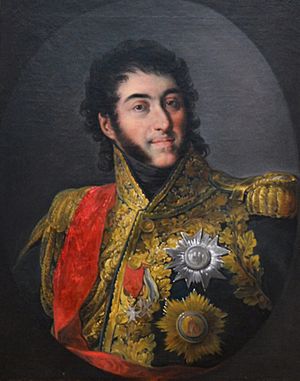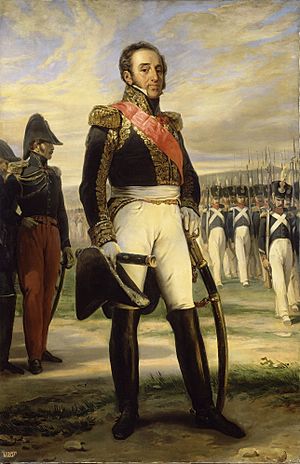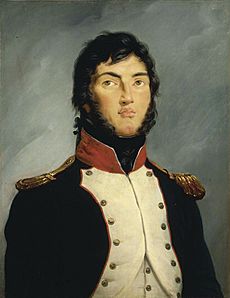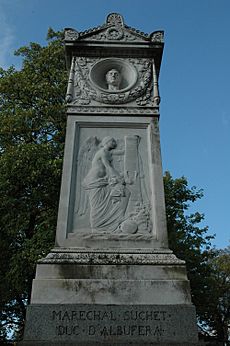Louis-Gabriel Suchet facts for kids
Louis-Gabriel Suchet (born March 2, 1770 – died January 3, 1826) was a famous French military leader. He was known as the Duke of Albufera. Suchet became a Marshal of the Empire, which was a very high rank in the French army. He was one of the most successful commanders during the French Revolutionary Wars and the Napoleonic Wars. Many people consider him one of the greatest generals of his time.
Contents
Early Life and Military Start
Suchet was born in Lyon, France. His family owned a business that made silk. At first, Louis-Gabriel planned to work in the family business. However, he joined the cavalry of the French National Guard as a volunteer. He quickly showed great skill and was promoted fast in the army.
Fighting in the Revolutionary Wars
In 1793, Suchet was a battalion chief. He helped capture the British general Charles O'Hara during the Siege of Toulon. In 1796, he was badly hurt at the Battle of Cerea in Italy. By October 1797, he was promoted to lead a "half-brigade" (a military unit).
Suchet was once a lieutenant colonel with little chance of moving up. He was sent to Venice to get uniforms for his soldiers. The people of Venice treated him like royalty because they thought France might rule them soon. He lived in a palace and enjoyed special treatment for two months.
One day, at a big dinner, a colonel named Dominique Martin Dupuy brought Suchet to Napoleon Bonaparte's table. Dupuy asked Napoleon when Suchet would become a colonel. Napoleon said, "Soon." So, Dupuy took off one of his own shoulder decorations and put it on Suchet, saying, "By my power, I make you colonel!" This funny moment worked! Napoleon immediately ordered Suchet to be promoted.
Suchet's good work in the Tyrol region and Switzerland led to him becoming a brigadier general. He did not go with Napoleon to Egypt. Instead, he became the chief of staff for General Guillaume Marie Anne Brune in Italy. Suchet helped make the army more organized and effective. In July 1799, he became a division general and chief of staff for General Barthelemy Catherine Joubert.
In 1800, Suchet was second-in-command to General André Masséna. He bravely defended his army's left side against stronger Austrian forces. This helped Napoleon cross the Alps, which led to the important Battle of Marengo on June 14. Suchet played a big part in the rest of the Italian campaign.
Leading in the Napoleonic Wars

Suchet became even more famous during the wars of 1805 and 1806. He fought well in battles like Austerlitz, Saalfeld, Jena, Pułtusk, and Ostrolenka. In 1808, he was given the title of count.
He was then sent to Spain. He helped in the Siege of Zaragoza. After this, he became the commander of the army in Aragon and its governor. In just two years, he brought the area under French control. He did this not only by fighting bravely but also by managing the region wisely.
Even after being defeated by the Spanish at Alcañiz, he quickly recovered. He then soundly beat the army of Blake y Joyes at the Battle of María on June 14, 1809. In 1810, he defeated O'Donnell at Lleida.
After the siege of Tarragona, he was made a marshal of France on July 8, 1811. In 1812, he captured Valencia. For this success, he was given the title of Duke of Albufera on January 24. When France started losing the wars, Suchet defended his areas in Spain one by one. Eventually, he had to leave Spain. He then joined Soult in defending France in 1814.
The Hundred Days and Later Life
When the Bourbon king Louis XVIII returned to power, he made Suchet a peer of France in the upper house of parliament. However, Suchet lost this title in July 1815 because he supported Napoleon when he briefly returned to power during the Hundred Days. During Napoleon's short return, Suchet was given command of an army on the border near the Alps.
Louis-Gabriel Suchet passed away at the Castle of Saint-Joseph near Marseille on January 3, 1826. His son, Louis-Napoleon (1813-1877), became the next Duke of Albufera.
Legacy
Suchet's memories of his campaigns in Spain were published in two books between 1829 and 1834.
A famous chicken dish, poularde à la d'Albuféra, is named after him.
Family
Suchet married Honorine Anthoine de Saint-Joseph on November 16, 1808. Honorine was a niece of Julie Clary, who was married to Joseph Bonaparte (Napoleon's brother). They had three children:
- Louise-Honorine (1811 – 1885)
- Louis-Napoleon (1813 – 1877)
- A daughter whose name is not known (1820 – 1835)
See also
 In Spanish: Louis Gabriel Suchet para niños
In Spanish: Louis Gabriel Suchet para niños
- Napoleonic Wars
- List of French generals of the Revolutionary and Napoleonic Wars
- French cuisine
- Asensio Nebot
 | Anna J. Cooper |
 | Mary McLeod Bethune |
 | Lillie Mae Bradford |




